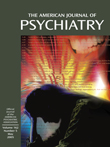Circadian Rhythm of Salivary Cortisol in Holocaust Survivors With and Without PTSD
Abstract
OBJECTIVE: The authors’ goal was to determine whether cortisol circadian rhythm alterations observed in younger subjects with posttraumatic stress disorder (PTSD) are also present in geriatric trauma survivors with PTSD. METHOD: Salivary cortisol levels were measured at six intervals from awakening until bedtime in 23 Holocaust survivors with PTSD, 19 Holocaust survivors without PTSD, and 25 subjects who had not been exposed to the Holocaust. Thirty-three of the subjects were men, and 34 were women. RESULTS: Cortisol levels were significantly lower at awakening, at 8:00 a.m., and at 8:00 p.m. in Holocaust survivors with PTSD than in nonexposed subjects, resulting in a flatter circadian rhythm, similar to what has been observed in aging but different from what has been reported in younger subjects with PTSD. CONCLUSIONS: These data provide evidence of differential neuroendocrine alterations in geriatric PTSD.



